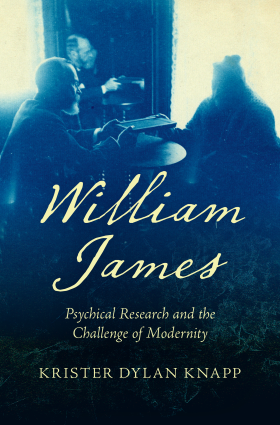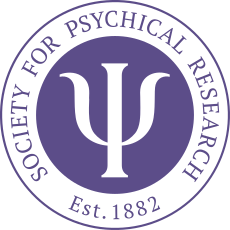
William James (1842-1910) was a significant figure in the history of psychology and philosophy, and Krister Dylan Knapp’s detailed analysis demonstrates the extent to which James’s longstanding interest in psychical research interpenetrated his other academic interests. Throughout his career James wrote about psychical research, yet while his biographers have generally marginalised this part of his corpus as being of little importance, an embarrassing eccentricity, Knapp shows convincingly that it was central to his intellectual life; more, it is not possible fully to understand his work as a whole without an appreciation of his psychical research writings.
Knapp has divided his book into three main sections: ‘Becoming a psychical researcher’, outlining the growth of James’s involvement which may have had its origin in the dinner table conversations of his Swedenborgian father and his father’s friends about Spiritualism; ‘Practising psychical research’, examining the scope of his activities in the field; and ‘Theorising psychical research’, which opens out the discussion to explore the impact of his experiences, particularly on his theories of consciousness and survival after death. The last he conceptualised in terms of a general melding of consciousnesses to form a ‘cosmic reservoir of memories’, which raises the issue to what extent one can talk of the continuation of the individual post-mortem personality.
James studied the entire range of topics subsumed under psychical research, but his primary focus was mediumship, notably sittings with the mental medium Leonora Piper (his ‘white crow’). He also witnessed physical mediumship but dismissed it as producing ‘phenomena of the dark-sitting and rat-hole type’, and was critical of physical medium Eusapia Palladino while characteristically acknowledging that some of her phenomena might be genuine. In all these endeavours James fought to bring the subject matter of psychical research under the scope of the scientific method, defending it against those critics who denied it came within science’s purview.
Key to his approach was an attempt to undermine entrenched positions, for example between psychical researchers and ‘tender-minded’ Spiritualists (who reasoned by ‘principles’), and between psychical researchers and ‘tough-minded’ scientists (who reasoned by ‘facts’), transcending such dualisms to facilitate a reconciliation, but not a synthesis – instead seeking a third way, or tertium quid. Applying this principle, James aimed to steer a course between those whom he considered to possess a tendency to credulity concerning the phenomena, and those who refused to examine them at all. The result was an ‘intellectual disposition’ that was not afraid to override scientific boundaries. Thus séances and other personal experiences were as valid a source of data as was the laboratory, and to reject them a priori was a question of faith, not science.
It was not just the subject to which he devoted his energies, but organisations as well, and he remained a firm supporter of both the Society for Psychical Research in Britain and its American counterpart. This was partly through a desire to support their efforts, but also from loyalty to individuals (notably Edmund Gurney, Henry and Eleanor Sidgwick, Frederic Myers and Richard Hodgson ) with whom he fostered deep bonds, ties that were broken only by death. He maintained some of his most enduring professional relationships with SPR members, and Myers’ ideas were particularly influential in the development of James’s thought, not least the notion of the subliminal self.
As well as researcher, theoretician, administrator and funder, James was a populariser, defending psychical research even when it threatened to undermine his reputation. Nor did he abandon it when it failed to fulfil its early promise; rather he retained an active interest to the end of his life. He remained cautious but optimistic regarding its prospects, and his conclusion towards the end of his career was that‘...we must expect to mark progress not by quarter-centuries, but by half-centuries or whole centuries.’
It is impossible in a short review to do justice to Knapp’s sympathetic dissection of James’s thought. While at times not an easy read, Knapp has done an impressive job in pulling together and making sense of James’s writings on psychical research, including his extensive correspondence, pointing out his strengths but not being afraid to indicate where he was wrong, on shaky ground, or contradicting himself. The result is essential reading for anyone who wishes to have a thorough understanding of James’s work in psychology and philosophy, or assess his substantial contributions to psychical research.
This review first appeared in Fortean Times, No. 356, August 2017, p. 62.

